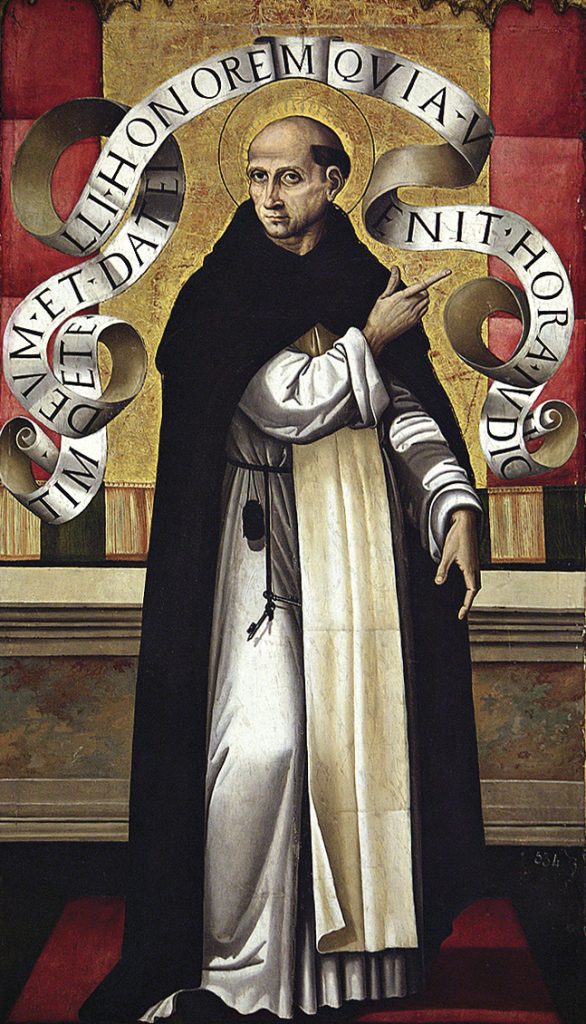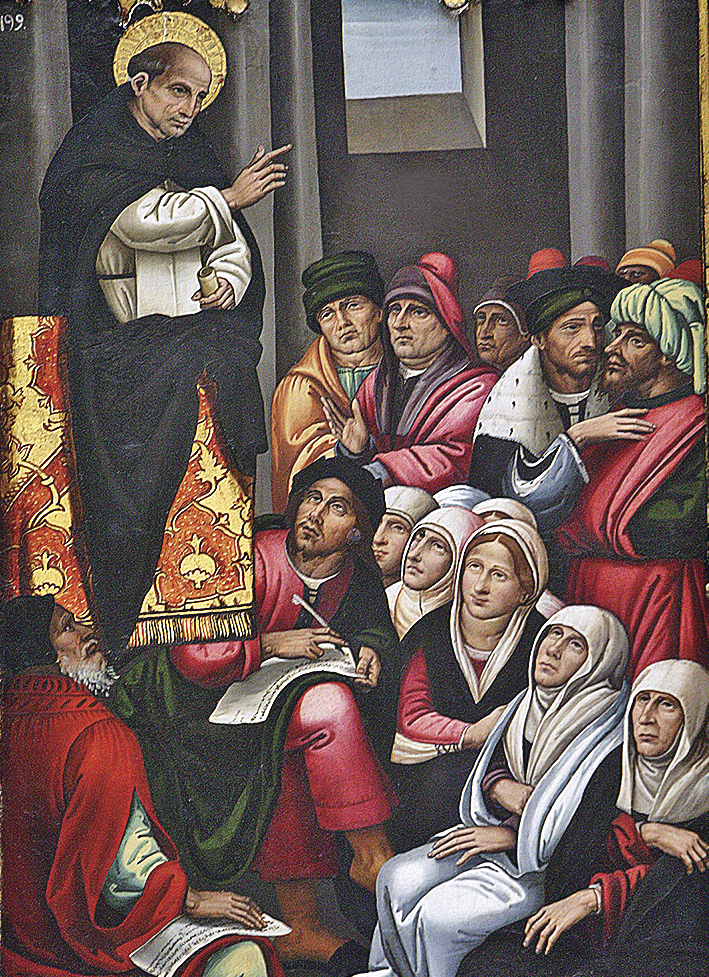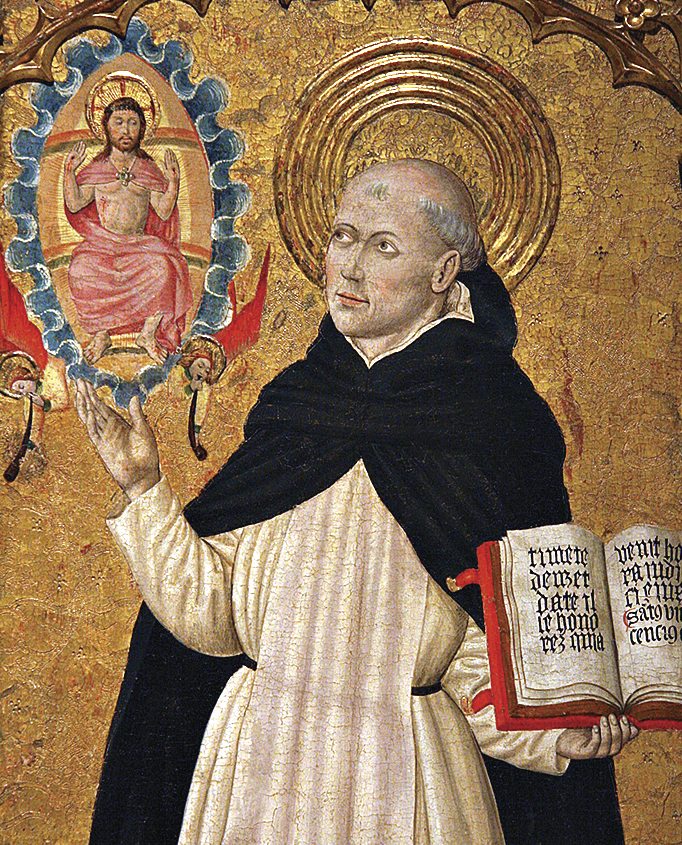“The wind blows where it wills…” (Jn 3:8). In His renowned nocturnal conversation with Nicodemus, Jesus used this image to explain to this Pharisee how the Holy Spirit acts in souls. God has a plan for each person, endowing everyone with adequate graces to attain holiness, but to some He grants, in addition to these, charisms destined to help others draw closer to Him. They are called graces gratis datæ—freely given—, since they are granted to man “beyond the capability of nature, and beyond the merit of the person.”1
Regarding these gifts, the Apostle teaches: “To each is given the manifestation of the Spirit for the common good. To one is given through the Spirit the utterance of wisdom, and to another the utterance of knowledge according to the same Spirit, to another faith by the same Spirit, to another gifts of healing by the one Spirit, to another the working of miracles, to another prophecy, to another the ability to distinguish between spirits, to another various kinds of tongues, to another the interpretation of tongues” (1Cor 12:7-10).
Meanwhile, as the Spirit “blows where it wills,” the story of chosen souls includes some who received not just one, but several of these charisms to guide the people of God with certainty through troubled times. One of these is the great St. Vincent Ferrer.
Signs of an outstanding vocation
God frequently announces the entrance of a chosen soul into the world with supernatural signs. This occurred within the Ferrer family. Shortly before our saint was born, his father, the Valencian notary Guillermo Ferrer, dreamt that he was listening to a sermon by a famous Dominican, in the middle of which the latter congratulated him, for he would soon be the father of a son distinguished for his learning and sanctity, an outstanding preacher, clothed in the Dominican habit.
But dreams are only dreams… in order to leave no room for doubt, God desired to reveal Himself more plainly. Vincent’s mother, who had already given birth to other children, experienced less difficulty in carrying this child, yet, she heard what sounded like the barking of a dog coming from her womb. Fearing that this was a bad omen, she sought the advice of the Bishop of Valencia, from whom she heard the prophecy that the unborn child “would be like an outstanding mastiff to guard the flock of the Christian people, awakening them from the torpor of sin with his barking, and putting to flight the infernal wolves.”2
On January 23, 1350, Vincent was born. Lively and intelligent, he shunned common youthful pastimes, gathering the children around himself to “preach” to them in his own child-like way. At 12 years of age, with a precocious command of grammar and logic, he began his studies of philosophy and theology. He was an honest and exemplary youth, who was often to be found at church, fasted twice a week, made long meditations on the Passion of Christ, prayed the Office of the Cross and the Hours of Our Lady, and practiced charity toward the poor and religious.

The “book” that inspired his sermons
He lived next to a monastery of the Dominican Order, and did not hesitate when his father encouraged him to enter it. He took the habit on February 5, 1367, and professed his vows the following year. An enemy of sloth, he dedicated himself to study and prayer, while maintaining strict observance of the rule. Even as a deacon, his preaching was so stirring that people came great distances to hear him. Ordained a priest in 1374, he alternated study and teaching, in Barcelona, Toulouse and Lerida, as his superiors decided.
At the age of 28, he received the title of master in theology. He knew the Bible so well that he quoted from it “with the same ease as if he had it before his eyes.”3 He had also mastered the exegesis of the saints and the Latin and Hebrew languages. Returning to Valencia, he distinguished himself in the Order as a professor, writer and counsellor. Yet, when asked from which book he found such inspiring thoughts for his sermons, he merely pointed to the Crucifix.
“Wicked one! I know who you are”
The devil did everything to dissuade him from the path of perfection he had embraced. On one occasion, he appeared to the saint under the guise of a venerable hermit, appealing to him to curb his radicality in the practice of virtue. “Be assured”—he told him—“that no one can avoid falling into some or other indiscretion, sooner or later. It is better for this to happen in the flower of youth than in old age.” Friar Vincent confronted him with the Sign of the Cross, invoked the name of God and Our Lady, and courageously proclaimed: “Go to where you belong, wicked one! I know who you are. Do you not know that God is with His servants and leads them by the hand so that they will not stumble? I have consecrated to Him not only my old age, but also my youth.”4 At these words the devil disappeared with a howl.
But a few days later he returned to goad him. The horrible spectre promised to set so many snares for him that there would be no way for him to escape hell. “I do not fear you”—the saint retorted—“while my Lord Jesus Christ is with me.” The devil rejoined: “He will not be with you always, for there is nothing more difficult than persevering in grace until the hour of death; and when Christ leaves you, then I will show you my power.” Friar Vincent was not intimidated: “My Lord God gave me the grace to begin, He will give me the grace to persevere in His service.”5
On another occasion, he beseeched the grace of preserving perfect chastity until the end of his life. Suddenly, he heard a voice telling him that he would soon lose his virginity, which left him disconsolate. He turned immediately to the Queen of Heaven, begging her to reveal to him the messenger of such disturbing news. “Suddenly Our Lady appeared with great splendour, in his cell, and consoled him, telling him that it was one of the devil’s attacks, at which he should not lose confidence, for she, who can outdo the fury of hell, would never forsake him.”6
In the Sacred Palace of Avignon
In 1378, the Western Schism erupted. Gregory IX died in Rome, and an agitated conclave, held amidst pressure and street uprisings, elected Urban VI as Pope. A few months later, twelve cardinals gathered in Agnani to declare this election invalid and chose Cardinal Robert of Geneva to occupy the papal chair. He took the name of Clement VII and established his court in Avignon.
Who was the legitimate Pope and who was the antipope? Today any reputable source reveals the answer, but at that time, the situation was far from clear. Political ambition and interest were at play on both sides, although good faith and true religious fervour also thrived. Saints, bishops and monarchs gave solid arguments fostering support of Urban VI or the antipope Clement. Christian Europe was divided between obedience to Rome and Avignon.
“Today it is difficult to appraise the confusion that such anarchy caused in souls,”7 a historian comments. The schism resounded throughout Christianity. “In dioceses, parishes and monasteries, bishop rose up against bishop, pastor against pastor, abbot against abbot! There was generalized uncertainly about the Faith and the validity of obedience.”8
Clement died in 1394, and Cardinal Peter of Luna succeeded him to the throne of Avignon with the name of Benedict XIII. Austere, pious and convinced of his legitimacy, this antipope immediately summoned Friar Vincent Ferrer to be his chaplain and confessor, also appointing him Master of the Sacred Palace and penitentiary of the papal court.
Friar Vincent, who sincerely supported the right of Benedict XIII to the pontifical throne, accepted the invitation and transferred to Avignon. As the problem of the schism worsened, Friar Vincent’s concern heightened. Certain positions of the Papa Luna—as he was known, being from the Luna family—deeply disappointed him. Furthermore, when he witnessed the growing division among those called to be united in Christ, he fell gravely ill and in three days was at death’s door.
In constant prayer, he asked God to save the Holy Church from that situation. The Redeemer then appeared to him, accompanied by Angels, St. Dominic and St. Francis. He revealed that the schism would end within a few days and that he would be chosen for a mission to preach against the evils of the time, calling the people to conversion: “Be steadfast and fear no one, for even though you will have no shortage of enemies and many will envy you, I will be your support so that you can overcome all obstacles and travel over much of Europe, preaching my Gospel; and, finally, you will die a holy death at the ends of the earth.” He then touched his face with His hand, saying: “Arise, my Vincent!”9 The saint was immediately cured.

Missionary by divine mandate
Friar Vincent decisively set out to fulfill his mission, fighting for Gospel integrity and Church unity. Despite the reluctance of Benedict XIII, he left Avignon on November 22 of 1399, with the approval of his superiors, to be a missionary in obedience to the divine mandate.
He travelled by foot; only when one of his legs became injured did he use a donkey. He preached in several countries: Spain, Portugal, France, Switzerland, Germany, Italy and England.
A profound interior life supported his preaching, which dealt with the four last things, especially the Final Judgement. He decried lying, perjury, blasphemy, calumny, usury, simony, adultery and the many other vices of that dissolute society. His motto was “Fear God and give Him glory, for the hour of His judgment has come” (Rev 14:7), for reverential fear of God is another name for love.
Veritable multitudes—learned and simple men, nobles and plebeians, lay people and religious—crowded around him to hear him preach. Results came pouring in: thieves returned their loot; enemies were reconciled; murderers and bandits repented; lost sheep returned to the Holy Church, and many left the world and consecrated themselves to God. He was accompanied by an entourage of confessors from different countries to attend penitents. He would personally go to Confession before the celebration of the solemn Mass, at which he preached.
At a time when many preachers leaned on the academic argumentation of their sermons or on empty rhetorical compositions that did not inspire the faithful, St. Vincent’s word was, on the contrary, “like a fiery torch that burned and illuminated.”10 It was the fire of charity that “stirred semi-dormant consciences, and thus he was, par excellence, the saint who opposed tepidity.”11
He preached in town squares and open fields, for the churches were not large enough to hold the thousands of listeners. He spoke with a powerful, richly nuanced and sonorous voice, that brought alive the power of God and His grace. He scrutinized the assembly with a penetrating gaze, and imaginatively captured their attention, developing his arguments with clear and precise concepts. All of this was backed by an extraordinary knowledge of Sacred Scripture, whose teachings he applied to the concrete facts and actual circumstances of his time.
Special charisms
Words of wisdom and learning, the gift of miracles, cures, prophecy, discernment of spirits, speaking in tongues and exorcism… It is impossible to enumerate all of the facets of his life that illustrate each of these charisms!
At a time before modern sound systems, Friar Vincent used his powerful voice to be heard at a great distance. But his biographers register instances where the supernatural played a part in this. Among one of the most astounding is the miracle of a monk from the Monastery of the Bernardines who, at a distance of eight leagues—more than 45 km—from where the saint spoke, heard and took down notes of one of his sermons.
After each preaching he cured the sick, blessing them and pronouncing the words: “These signs will accompany those who believe: they will place their hands on the sick and they will be cured. Jesus Christ, Son of Mary, health and Lord of the world, just as He brought you the Catholic Faith, in it He will also keep you and make you blessed, and He wishes to free you from this infirmity.”12

Like the Apostles on the day of Pentecost, he always spoke in his own language—the Valencian dialect—and was perfectly understood, in whatever country or kingdom he preached. He also expelled the devil wherever he went. On one occasion, three fire-breathing horses rushed headlong into the multitude of faithful, moved by demons who were outraged to see the people escaping from their clutches. They were put to flight by the power of St. Vincent’s authority.
He foresaw the near and distant future. One of the most famous episodes is that of a Valencian citizen who asked him to bless his young nephew, Alfonso de Borja. Vincent said to him: “Send this child to school, for he will become Pope and honour me greatly.” Some years later, the young Alfonso went to greet him and heard this prophecy: “I rejoice, son, for your good. You will be the Supreme Pontiff and will canonize me in due time.”13 In fact, years later, he was ordained Bishop of Valencia, became Pope Callixtus III and was privileged to canonize the saint…
“Nunc dimittis servum tuum, Domine”
Obedient to the office that had been confided to him, he did not let advanced age or fatigue stop him. He needed help to ascend the platforms, but seemed to regain strength when he began to speak.
Finally, the much-desired unity of the Church was achieved at the Council of Constance, at which the influence of St. Vincent contributed greatly to end the schism. There, on November 11, 1417, the conclave was held to elect Pope Martin V, to whom all of Christianity submitted their obedience. It could be said that the saint proclaimed his Canticle of Simeon — “Nunc dimittis servum tuum, Domine” (Lk 2:29) —, for only two years later he died in Vannes, Brittany, on April 5, 1419, as Jesus had foretold.
Thirty-six years later, the aforementioned Callixtus III raised him to the honours of the altar. Having courageously and heroically fulfilled his mission, he is one of the glories of Spain, the Order of Preachers and the Church, for “with the exception of the Apostles, there has probably been no one who surpassed St. Vincent Ferrer as a preacher.”14 ◊
Notes
1 ST. THOMAS AQUINAS. Summa Theologiæ, I-II, q.111, a.1.
2 ANTIST, OP, Vicente Justiniano. Vida y historia del apostólico predicador San Vicente Ferrer. In: ST. VINCENT FERRER. Biografía y Escritos. Madrid: BAC, 1956, p.99.
3 Idem, p.104-105.
4 Idem, p.108.
5 Idem, p.109.
6 Idem, ibidem.
7 DANIEL-ROPS, Henri. A Igreja da Renascença e da Reforma – I. A reforma protestante. São Paulo: Quadrante:1996, p.35.
8 Idem, ibidem.
9 ANTIST, op. cit., p.116.
10 MILAGRO, OP, José María. San Vicente Ferrer. In: ECHEVERRÍA, Lamberto de; LLORCA, SJ, Bernardino; REPETTO BETES, José Luis (Org.). Año Cristiano. Madrid: BAC, 2003, v.IV, p.96.
11 CORRÊA DE OLIVEIRA, Plinio. Conference. São Paulo, April 4, 1966.
12 ANTIST, op. cit., p.121.
13 Idem, p.137.
14 CORRÊA DE OLIVEIRA, Plinio. Como um profeta do Antigo Testamento. In: Dr. Plinio. Ano XVI. N.181 (Abr., 2013); p.2.


